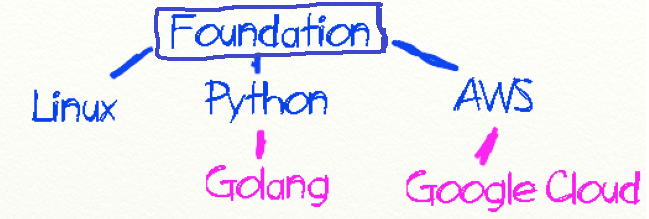How To Become a DevOps Engineer In Six Months or Less
NOTE: This is Part 1 of a multi-part series.
Part 2 is here.
Target Audience
Are you a developer looking to shift your career towards a more DevOps model?
Are you are a classically trained Ops person and you would like to get a feeling of what this whole DevOps thing is all about?
Or are you neither, and simply looking for a career change and have no idea where to start? If so, read on!
Finally, if you have been doing this DevOps thing for years now, you might still find this useful as a validation of where we are and where this is going.
What’s This, Now?
First, what is DevOps?
You can google the definitions and wade through all that buzzword extravaganza but know that most are embarrassingly long word salads stuffed into giant run-on sentences. (See what I did here?)
So, I’ll save you the clicks and distill it down:
DevOps is a way to deliver software with shared pain and responsibility.
That’s it.
OK, but what does that mean?
It means that traditionally, the developers (people who create software) had incentives that were vastly different from operations (people who run software.)
For example, as a developer, I want to create as many new features as fast as possible. After all, this is my job and that’s what customers demand!
However, if I’m an ops person, then I want as few new features as possible because every new feature is a change and change is risky.
As a result of this misalignment of incentives, DevOps was born.
DevOps attempts to fuse development and operations (DevOps, get it?) into one group. The idea is that one group will now share both the pain and the responsibility (and presumably, the rewards) of creating, deploying, and generating revenue from customer-facing software.
Now, purists will tell you know that there is no such thing as a “DevOps Engineer”. “DevOps is a culture, not a role,” they will tell you.
Yeah, yeah. They are technically correct (the worst kind of correct!) but as it so often happens, the term has morphed beyond its original meaning.
Now, being a DevOps Engineer is something like “Systems Engineer 2.0.”
In other words, somebody who understands the Software Development Lifecycle and brings software engineering tools and processes to solve classic operations challenges.
DevOps ultimately means building digital pipelines that take code from a developer’s laptop all the way to revenue generating prod awesomeness!
That’s what it’s all about!
Also note that as a career choice, the whole DevOps space is highly compensated, with almost every company either “doing DevOps” or claiming to do so.
Regardless of where the companies are, the overall DevOps job opportunities are plentiful, offering fun, meaningful employment for years to come.
NOTE: Be wary of companies hiring for a “DevOps team” or a “DevOps department.” Strictly speaking, such things should not exist because ultimately, DevOps is all about the culture and a way of delivering sofware, not a new team or department to be staffed up.
Disclaimer
Now, let’s put the glass of Kool-Aid aside for a moment and consider the following.
Have you heard the old adage, “there are no junior DevOps engineers?”
If not, please know it is a popular trope on Reddit and StackOverflow. But what does that mean?
Simply put, it means that it takes many years of experience, combined with a solid understanding of tools, to eventually become a truly effective Senior DevOps practitioner. And sadly, there is no shortcut for experience.
So, this is not an attempt to cheat the system — I don’t think that’s actually possible to pretend to be a Senior DevOps Engineer with a few months of experience. Solid understanding of the rapidly changing tools and methodologies takes years to master and there is no getting around that.
However! There is a roughly agreed upon (trendy, if you will) menu of tools and concepts that most companies use and that is what the article is all about!
Again, tools are different from skills, so while you are learning the tools, make sure you don’t neglect your skills (interviewing, networking, written communication, troubleshooting, etc.)
Most importantly, don’t lose track of what we are after — building a fully automated digital pipeline that takes ideas and turns them into revenue generating pieces of code.
That is the single, most important take-away from this entire article!
Enough Talk, Where Do I Start?
Below is your roadmap.
Master the following and you can safely and honestly call yourself a DevOps Engineer! Or a Cloud Engineer if you detest the “DevOps” title.
The map below represents mine (and probably the majority of folks working in this space) idea of what a competent DevOps Engineer should know. That said, it is only an opinion and there will certainly be dissenting voices. That is OK! We are not after perfection here, we are after a solid foundation upon which to build.
NOTE: You are meant to traverse this breadth-first, layer by layer. Start (and continue!) with the foundation first. Learn the technologies in blue first (Linux|Python|AWS), then if time permits or job market demands, go after the purple stuff (Golang|Google Cloud).


Again, go after the first layer in every pillar. Then, time permitting, go after the second layer to add depth to your expertise.
Once you have the Foundation layer reasonably figured out, move onto the real-world set of skills. Notice there are 6 blue columns total, one per month.
